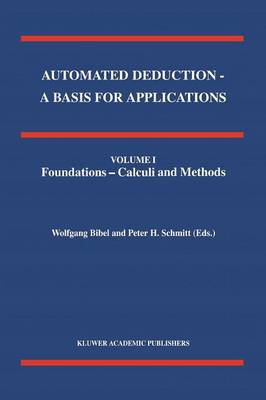Applied Logic
1 primary work
Book 9
The nationwide research project `Deduktion', funded by the `Deutsche Forschungsgemeinschaft (DFG)' for a period of six years, brought together almost all research groups within Germany engaged in the field of automated reasoning. Intensive cooperation and exchange of ideas led to considerable progress both in the theoretical foundations and in the application of deductive knowledge. This three-volume book covers these original contributions moulded into the state of the art of automated deduction.
The three volumes are intended to document and advance a development in the field of automated deduction that can now be observed all over the world. Rather than restricting the interest to purely academic research, the focus now is on the investigation of problems derived from realistic applications. In fact industrial applications are already pursued on a trial basis. In consequence the emphasis of the volumes is not on the presentation of the theoretical foundations of logical deduction as such, as in a handbook; rather the books present the concepts and methods now available in automated deduction in a form which can be easily accessed by scientists working in applications outside of the field of deduction. This reflects the strong conviction that automated deduction is on the verge of being fully included in the evolution of technology.
Volume I focuses on basic research in deduction and on the knowledge on which modern deductive systems are based. Volume II presents techniques of implementation and details about system building. Volume III deals with applications of deductive techniques mainly, but not exclusively, to mathematics and the verification of software.
Each chapter was read by two referees, one an international expert from abroad and the other a knowledgeable participant in the national project. It has been accepted for inclusion on the basis of these review reports.
Audience: Researchers and developers in software engineering, formal methods, certification, verification, validation, specification of complex systems and software, expert systems, natural language processing.
The three volumes are intended to document and advance a development in the field of automated deduction that can now be observed all over the world. Rather than restricting the interest to purely academic research, the focus now is on the investigation of problems derived from realistic applications. In fact industrial applications are already pursued on a trial basis. In consequence the emphasis of the volumes is not on the presentation of the theoretical foundations of logical deduction as such, as in a handbook; rather the books present the concepts and methods now available in automated deduction in a form which can be easily accessed by scientists working in applications outside of the field of deduction. This reflects the strong conviction that automated deduction is on the verge of being fully included in the evolution of technology.
Volume I focuses on basic research in deduction and on the knowledge on which modern deductive systems are based. Volume II presents techniques of implementation and details about system building. Volume III deals with applications of deductive techniques mainly, but not exclusively, to mathematics and the verification of software.
Each chapter was read by two referees, one an international expert from abroad and the other a knowledgeable participant in the national project. It has been accepted for inclusion on the basis of these review reports.
Audience: Researchers and developers in software engineering, formal methods, certification, verification, validation, specification of complex systems and software, expert systems, natural language processing.
